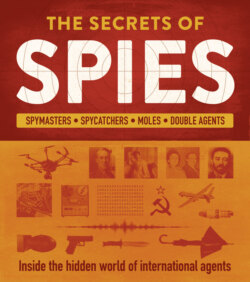Читать книгу The Secrets of Spies - Weldon Owen - Страница 49
На сайте Литреса книга снята с продажи.
ОглавлениеCHAPTER 3 NINETEENTHCENTURY INTELLIGENCE
50
THE AMERICAN CIVIL WAR
Amateur spies came to the fore during the American Civil War. They proved highly effective,
none more so than the female secret agents who made their mark in the history of espionage.
Both the Unionists and the Confederates developed ad hoc intelligence agencies to gather information.
Spying was carried out on a wide scale because the nature of the war made it easy to do so. Both sides
spoke the same language and they looked alike, while political affiliations were mixed and did not rely
entirely on geography, meaning that pro-abolitionists favoring the Union lived in the South and
Confederate sympathizers were based in the North. The scarcity of fixed military positions enabled
spies to move between the lines with comparative ease.
Above: Elizabeth Van Lew
UNIONIST FIELD AGENTS
In the Unionist North, notable spy chiefs
included Alan Pinkerton—who later
created the Pinkerton Detective Agency—
and Colonel George H. Sharpe, who
provided intelligence to generals
Hooker and Grant and set up the
Bureau of Military Information.
The Bureau had as many as
seventy agents in the field,
and it collated their reports
along with intelligence from
captured prisoners and
enemy documents retrieved
from the battlefield. Sharpe
acted as a handler for Elizabeth Van Lew,
considered to be one of his best spies.
Another excellent source of information
came from slaves or former slaves, who
were intimately acquainted with the
Confederate South, their reports known
as Black Dispatches. Leading black spies
included George Scott, John Scobell, and
Mary Jane Richards, as well as Harriet
Tubman, who had already achieved fame
for her part in the Underground Railroad
for escaped slaves.
ELIZABETH VAN LEW
Living in the Confederate capital of Richmond,
Virginia, Elizabeth Van Lew was a convinced
abolitionist who had freed her own slaves in
1843, including Mary Jane Richardson (or
Bowser). Once war had broken out, Van Lew
assisted in the welfare of Union prisoners.
She then set up a spy ring—the Richmond
Underground—that included Richardson, her
most important source. Van Lew managed to
have Richardson taken in as a servant in the house
of Jefferson Davis, the Confederate president.
The Richmond Underground ran five intelligence
“depots”; the spies delivered reports to Van Lew,
who then assigned them to couriers to slip
through enemy lines to her Union handlers.
Right: Having herself escaped from
slavery, Harriet Tubman guided dozens
of people to escape to freedom along the
Underground Railroad before the Civil
War. During the war, Tubman was a scout
and spy for the Union Army.
Above: William A. Jackson, a slave
in the house of Jefferson Davis,
who spied for the Union
